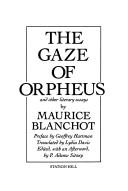
It becomes helpful in this regard to take up a term that Jean Wahl coined and that was later used by Levinas, that is, “transdescendence,” which begins to concretize some of the disturbing implications of a step beyond finitude that recoils on itself, leading to an inner descent into the enigma of what there is. What repeatedly arises from these examinations is the evasive nature of the limits of language, which persist and yet remain intangible, creating a pressure that destabilizes any establishment of meaning, thereby propelling language into an ambivalence without end. I will begin by tracing the development of Blanchot’s earliest thoughts on this issue through three major essays from the years 1941–45 at each stage in this development Blanchot’s writings draw out different aspects of the relation of language to its limits that demonstrate the peculiarity of this relation. What is compelling about Blanchot’s response to this problem is the way that he transforms it by reading it in terms of literature, but doing so does not reduce its philosophical or theological complexity instead, literature seems to make the issue of transcendence more profound by problematizing the nature of the limit that is seemingly being overstepped. To pinpoint this idiosyncratic transformation, I will focus on the issue of the nature of transcendence, which was much discussed at the time when Faux pas was being written and which draws out the relation between philosophy and theology, and also politics. Works of these philosophers are refracted through the lens of literature, which in turn then casts a strange light back upon those philosophical problems. Allen / Research in Phenomenology 39 (2009) 69–98 Significantly, this independence arises because Blanchot approaches philosophy by way of literature, with which he has a profoundly singular relation, rather than treating philosophical problems directly, and so issues that he may find in the The climate of French philosophy at this time was heavily influenced by Hegel, Kierkegaard, Nietzsche, Husserl, and Heidegger, but what is interesting is the manner in which Blanchot’s writings develop within the purview of these influences without directly following any of them. The evidence for this intuition lies in the pages of his first critical collection, Faux pas, which was published in 1943 and largely consists of articles written over the previous two years. The significance of this point is that it demonstrates that Blanchot’s work is guided from the very beginning by a set of concerns that he develops persistently and autonomously and that, as a result, despite the considerable overlap that his thinking has with that of Bataille and, to a much lesser extent, Levinas, his writings must be considered as an independent and original development in French thought. The central intuition that guides this work is that there is in Maurice Blanchot’s earliest critical works evidence of all the major literary and philosophical issues that he will study across his career. Keywords Blanchot, Heidegger, anguish, ambiguity, transdescendence

In turn this exposes the essential relation between finitude and literature, something which the second part of the essay will examine by way of Heidegger’s study of the myth of Er.

Doing so indicates the radical way that Blanchot reconfigures this central ontological and theological term by way of his readings of the literary use of language. Research in Phenomenology 39 (2009) 69–98ĭead Transcendence: Blanchot, Heidegger, and the Reverse of LanguageĪbstract In this essay I will examine the development of the notion of transcendence in Blanchot’s early critical writings.


 0 kommentar(er)
0 kommentar(er)
